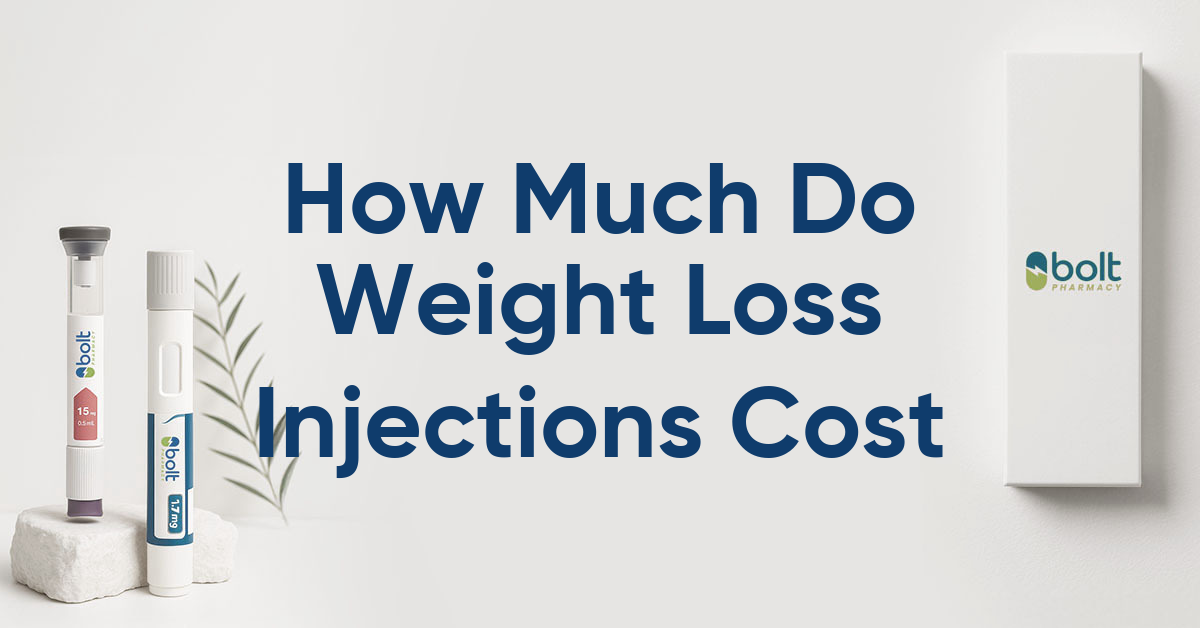How much do weight loss injections cost in the UK? For those considering GLP-1 receptor agonists such as semaglutide (Wegovy) or liraglutide (Saxenda), understanding the financial commitment is essential. Private prescriptions typically range from £150 to £300 monthly, translating to annual costs of £1,800 to £3,600 or more. NHS provision offers substantial savings—just the standard prescription charge or free in some UK nations—but access is strictly limited by NICE eligibility criteria, with considerable waiting times. This article examines the costs, factors affecting pricing, and differences between NHS and private routes to help patients make informed decisions about these clinically supervised weight management medications.
Summary: Weight loss injections in the UK cost between £150 and £300 per month privately, or just the standard NHS prescription charge (£9.90 in England) when accessed through specialist NHS services with strict eligibility criteria.
- Semaglutide (Wegovy) and liraglutide (Saxenda) are GLP-1 receptor agonists that reduce appetite by mimicking a naturally occurring hormone involved in satiety regulation.
- NICE guidance restricts NHS prescribing to adults meeting specific BMI thresholds with weight-related comorbidities, provided within specialist weight management services for up to 2 years.
- Private treatment requires continuous administration for 6–12 months or longer, with total annual costs potentially exceeding £3,600 excluding consultations and monitoring.
- Supply shortages documented by the MHRA have periodically affected availability and pricing across both NHS and private sectors.
- Patients should only obtain these prescription-only medicines from UK-regulated pharmacies registered with the General Pharmaceutical Council to ensure safety and product authenticity.
Table of Contents
What Are Weight Loss Injections and How Do They Work?
Weight loss injections represent a relatively new class of medications designed to support significant weight reduction in adults with obesity or those who are overweight with weight-related health conditions. The most commonly prescribed medications in the UK include semaglutide (marketed as Wegovy) and liraglutide (marketed as Saxenda). These belong to a drug class called GLP-1 receptor agonists, which were originally developed for managing type 2 diabetes but have demonstrated efficacy in weight management.
These medications work by mimicking a naturally occurring hormone called glucagon-like peptide-1 (GLP-1), which plays several important roles in appetite regulation and metabolism. When administered via subcutaneous injection (typically once weekly for semaglutide or once daily for liraglutide), they act on receptors in the brain to reduce hunger and increase feelings of fullness after eating. Additionally, they slow gastric emptying, meaning food remains in the stomach longer, which contributes to prolonged satiety. This mechanism helps patients consume fewer calories without experiencing the intense hunger that often undermines traditional weight loss efforts.
Clinical trials have shown different levels of efficacy: semaglutide typically achieves 10-15% weight loss over 68 weeks, while liraglutide generally produces 5-8% weight loss over 56 weeks. These medications must be used under medical supervision and have specific eligibility criteria. NICE guidance for semaglutide (TA875) recommends use for adults with a BMI of 35 kg/m² or above (or 32.5 kg/m² or above for people from certain ethnic backgrounds) with at least one weight-related comorbidity. Liraglutide (TA664) has narrower criteria, focusing on those with non-diabetic hyperglycaemia and high cardiovascular risk. Both medications should be prescribed within specialist weight management services, typically for up to 2 years, with regular reviews to assess response.
Common side effects include gastrointestinal symptoms such as nausea, diarrhoea and constipation. These medications are not recommended during pregnancy or breastfeeding. Patients should report any suspected side effects to the MHRA Yellow Card scheme (yellowcard.mhra.gov.uk).
How Much Do Weight Loss Injections Cost in the UK?
The cost of weight loss injections in the UK varies considerably depending on the specific medication, dosage, supplier, and whether you access them through the NHS or privately. For private prescriptions as of early 2024, patients can expect to pay between £150 and £300 per month for treatment, though prices can fluctuate based on market availability and demand. Semaglutide (Wegovy) typically costs between £200-£300 monthly when purchased through private clinics or online prescription services, whilst liraglutide (Saxenda) generally ranges from £150-£250 per month.
These monthly costs reflect the ongoing nature of treatment, as weight loss injections require continuous administration to maintain their effect. Most patients require treatment for at least 6-12 months to achieve meaningful weight loss, and many continue longer-term to sustain results. This means the total annual cost for private treatment can range from £1,800 to £3,600 or more, representing a significant financial commitment. Some private providers offer subscription models or package deals that may reduce per-month costs slightly, but the overall expense remains substantial.
It's important to note that these figures represent the medication cost alone and may not include additional expenses such as initial consultations (typically £50-£150), follow-up appointments, blood tests, or other monitoring requirements. Some private clinics bundle these services into comprehensive weight management programmes, which can cost upwards of £2,000-£4,000 annually. Patients should also be aware that supply shortages have periodically affected availability in the UK, as confirmed by MHRA and Department of Health and Social Care alerts, sometimes driving prices higher or making certain medications temporarily unavailable.
Patients should only obtain these medications from UK-regulated pharmacies and providers, avoiding unlicensed or compounded GLP-1 products that may be marketed online at lower prices but carry significant safety risks.
NHS vs Private Weight Loss Injection Costs
The cost difference between NHS and private provision of weight loss injections is substantial, making the route of access a crucial consideration for patients. NHS prescriptions for weight loss injections are available but strictly limited according to NICE guidance. When prescribed through the NHS, patients pay only the standard prescription charge (currently £9.90 per item in England, with prescriptions free in Scotland, Wales, and Northern Ireland). For those exempt from prescription charges or holding a prescription prepayment certificate, the medication may be entirely free. This represents enormous savings compared to private costs, potentially saving patients thousands of pounds annually.
However, accessing weight loss injections through the NHS comes with significant constraints. Eligibility criteria are stringent and differ between medications: patients must meet specific BMI thresholds (adjusted for ethnicity), have weight-related comorbidities, and have demonstrated unsuccessful attempts at weight loss through lifestyle interventions alone. Importantly, NHS treatment must be provided within specialist weight management services with multidisciplinary team support and is typically limited to a maximum of 2 years. Treatment continuation depends on meeting specific weight loss targets (at least 5% reduction after 12 weeks for liraglutide or 5% after 6 months for semaglutide). Even when eligible, waiting times can be considerable, often extending to several months or longer depending on local commissioning decisions and availability. Some NHS areas have restricted or suspended new prescriptions due to national supply constraints and budget pressures.
Private provision offers faster access, often with appointments available within days or weeks, but private prescribers must still follow UK product licences and professional standards. This means the same clinical eligibility criteria apply, though the threshold for access may feel less restrictive. Private treatment comes at considerable expense, with patients bearing the full cost of medication and associated care. Private clinics vary in quality, and patients should ensure they choose providers registered with the Care Quality Commission (CQC) and pharmacies registered with the General Pharmaceutical Council (GPhC). Some private services operate primarily online, which may reduce costs but could compromise the quality of medical supervision. Regardless of route, patients should receive comprehensive support including dietary advice, physical activity guidance, and regular monitoring of weight loss progress and potential adverse effects.
Factors That Affect the Price of Weight Loss Injections
Several key factors influence the cost of weight loss injections, creating significant price variation across different providers and circumstances. Medication type and dosage represent the primary cost determinant. Semaglutide (Wegovy) is generally more expensive than liraglutide (Saxenda), partly due to its once-weekly administration compared to daily injections, and its more recent market entry. Dosage escalation protocols, which gradually increase the dose to minimise side effects and optimise efficacy, mean costs may vary during the initial titration phase versus maintenance treatment.
Supply and demand dynamics have significantly impacted pricing in recent years. Global shortages of GLP-1 medications, documented in MHRA and Department of Health and Social Care supply alerts, have led to price increases and restricted availability. Some pharmacies and clinics have implemented waiting lists or prioritised existing patients, whilst others have raised prices in response to scarcity. The source of supply also matters: established high-street pharmacies, online prescription services, specialist weight management clinics, and hospital-based services all operate different pricing models. Online services may offer lower prices due to reduced overheads, but patients should verify they're using legitimate providers registered with the General Pharmaceutical Council (GPhC) and Care Quality Commission (CQC).
Additional service components substantially affect overall costs. Comprehensive weight management programmes that include regular consultations with doctors, dietitians, or specialist nurses, ongoing monitoring, blood tests, and behavioural support naturally cost more than medication-only services. Some providers charge separate fees for initial assessments, follow-up appointments, and prescription renewals, whilst others bundle these into monthly subscription fees. Geographic location can influence pricing, with London and other major cities typically charging premium rates compared to other regions.
Finally, insurance coverage is unlikely to offset costs for most patients. Most standard private medical insurance policies in the UK exclude weight loss medications and obesity treatments. In rare cases, some comprehensive policies or employer-sponsored schemes might provide partial coverage, particularly when obesity is associated with specific medical conditions that would otherwise require treatment. Patients should check their policy details carefully before assuming any coverage. Understanding these factors helps patients make informed decisions while ensuring appropriate medical supervision and support.
Scientific References
Frequently Asked Questions
Are weight loss injections free on the NHS?
Weight loss injections are available on the NHS for eligible patients who meet strict NICE criteria, with costs limited to the standard prescription charge (£9.90 per item in England, free in Scotland, Wales, and Northern Ireland). However, access is restricted to specialist weight management services with significant waiting times.
How long do I need to take weight loss injections?
Most patients require weight loss injections for at least 6–12 months to achieve meaningful results, with many continuing longer-term to sustain weight loss. NHS treatment is typically limited to a maximum of 2 years with regular reviews to assess response and continuation criteria.
Does private medical insurance cover weight loss injections?
Most standard private medical insurance policies in the UK exclude weight loss medications and obesity treatments. Some comprehensive or employer-sponsored schemes may provide partial coverage when obesity is associated with specific medical conditions, but patients should verify their policy details directly.
The health-related content published on this site is based on credible scientific sources and is periodically reviewed to ensure accuracy and relevance. Although we aim to reflect the most current medical knowledge, the material is meant for general education and awareness only.
The information on this site is not a substitute for professional medical advice. For any health concerns, please speak with a qualified medical professional. By using this information, you acknowledge responsibility for any decisions made and understand we are not liable for any consequences that may result.
Heading 1
Heading 2
Heading 3
Heading 4
Heading 5
Heading 6
Lorem ipsum dolor sit amet, consectetur adipiscing elit, sed do eiusmod tempor incididunt ut labore et dolore magna aliqua. Ut enim ad minim veniam, quis nostrud exercitation ullamco laboris nisi ut aliquip ex ea commodo consequat. Duis aute irure dolor in reprehenderit in voluptate velit esse cillum dolore eu fugiat nulla pariatur.
Block quote
Ordered list
- Item 1
- Item 2
- Item 3
Unordered list
- Item A
- Item B
- Item C
Bold text
Emphasis
Superscript
Subscript












